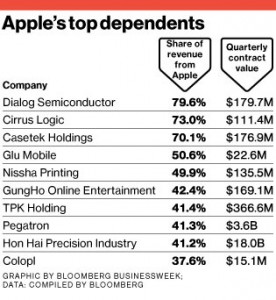For the loyal Apple customer, Apple can do no wrong. Apple reported Four million iPhone 6 and iPhone 6 plus’ pre ordered in the first 24 hours. Last year Apple sold over 150 million phones.(Satariano and Burrows) The company’s success is attributed to their innovative products which have superior functionality and exceptional user experience. Second to the product is the supply chain management that allows Apple to deliver the high demand products on time to the users.
The iPhone is the most popular phone in the world, in order for Apple to produce and deliver the sheer volume of phones to meet the demand they must create exclusivity agreements with suppliers in exchange for volume guarantees. Working with its supply chain partners, Apple helped develop new manufacturing processes, some of which have been the subject of patents filed by the company.(Apple’s process,pars 5)
Apple is always innovating their products and they do it at no cost and without any consideration of the suppliers. Suppliers of Apple sometimes come out winners and sometimes losers. The iPhone alone has components that come from dozens of different companies. Apple has a reputation as a brutally tough negotiator with companies in its supply chain, demanding advanced technology at razor-thin margins, and it doesn’t hesitate to drop longtime suppliers with little notice, says Francis Sideco, a senior manager at market researcher IHS (IHS). At least nine publicly traded companies get more than 40 percent of their revenue from Apple, data compiled by Bloomberg shows.
Audience, a mobile audio processor maker saw their stock plummet from a high of $22 a share to about $8.50 a share when their parts were left out of the iPhone 5 in 2012.(Satariano and Burrows) Peter Santos, chief executive officer of Audience says they struggled to replace lost orders with business from other phone makers because he had no notice. Apple didn’t tell him his company was cut out, and he only knew for sure when his engineers bought an iPhone 5 and took it apart.
What makes Apple great is also what gives them the reputation of being ruthless. Apple is very involved in all aspects of the supply chain management and it’s been that way since late Steve Jobs return in 1997. Apple has a lot of power and leverage when they negotiate the terms on parts, manufacturing and transportation, this in large is what allows Apple to make a superior product to its competitors at a price that is hard to rival and still make a 25 percent profit margin. The bottom line is the company is highly regarded by the end user. Apple’s ruthlessness is what gives them the advantage and keeps them in the green year after year. Some suppliers have begun to reduce their dependence on Apple.
Is the old idiom, business is business, always true? Is it okay for a company to have a ruthless mentality? When the end-users are happy and the company sees huge profits, is it all that matters?
http://www.businessweek.com/articles/2014-09-18/some-apple-suppliers-get-cut-off-must-scramble-for-new-business
http://www.usanfranonline.com/resources/supply-chain-management/apples-process-improvements-make-it-a-global-supply-chain-leader/#.VDjg8mddV_B

